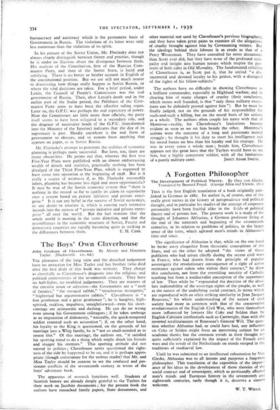A Forgotten Philosopher
THIS is the first English translation of a book originally pub- fished in German in 1880. Its author is, of course, one of the really great names in the history of jurisprudence and political thought, and in particular his studies of the concept of corporate personality have been fruitful alike in the fields of political theory and of private law. The present work is a study of the thought of Johannes Althusius, a German professor living at the end of the sixteenth and beginning of the seventeenth centuries, in its relation to problems of politics, in the larger sense of the term, which agitated men's minds in Althusius's time and since.
The significance of Althusius is that, while on the one hand he broke away altogether from theocratic conceptions of the State, and on the other he adopted " the views of those publicists who had arisen chiefly during the recent civil war, in France, who had drawn from the principle of popular sovereignty the revolutionary consequence of a right of active resistance against rulers who violate their contract," he drew this conclusion, not from the overriding sanctity of Catholic teaching but from a mediaevalist conception of the supremacy of law. Thus while he " expounded the doctrine of the abso- lute inalienability of the sovereign rights of the people, as well as the nature of the underlying social contract, in terms which are reproduced with an often striking similarity in Jean Jacques Rousseau," his whole understanding of the nature of civil society had more in common with that of the conservative revolutionaries of the English Civil War, who were themselves more influenced by lawyers like Coke and Selden than by English Calvinist intellectuals such as Cartwright, than with the inverted totalitarianism of Rousseau's General Will. The ques- tion whether Althusius had, or could have had, any influence on Coke or Selden might form an interesting subject for an academic thesis; but the common trends in their thought arc quite sufficiently explained by the impact of the French civil wars and the revolt of the Netherlands on minds steeped in the traditions of mediaeval law.
Until he was submitted to an intellectual exhumation by Von Gierke, Althusius was to all intents and purposes a forgotten philosopher. This translation of the exposition of the impor' ance of his ideas in the development of those theories of th • social contract and of sovereignty, which so profoundly affected men's minds and European history in the seventeenth and eighteenth centuries, tardy though it is, deserves a sinter' welcome.
W. T. WELLs.


































 Previous page
Previous page